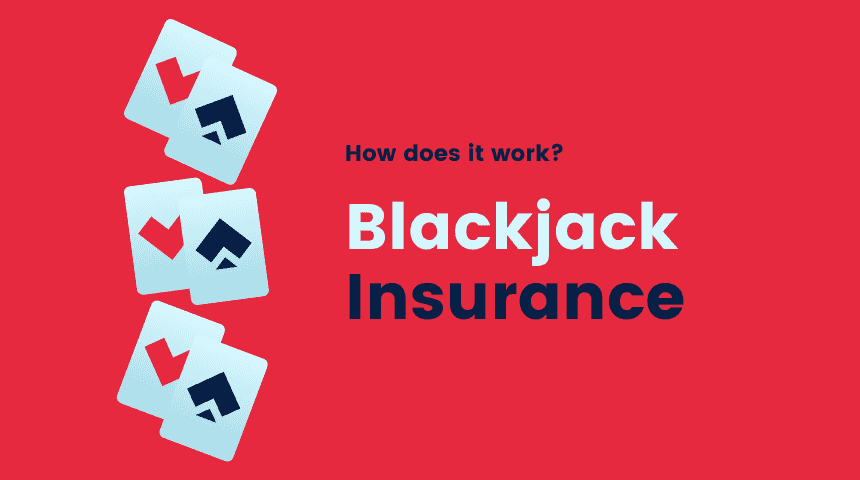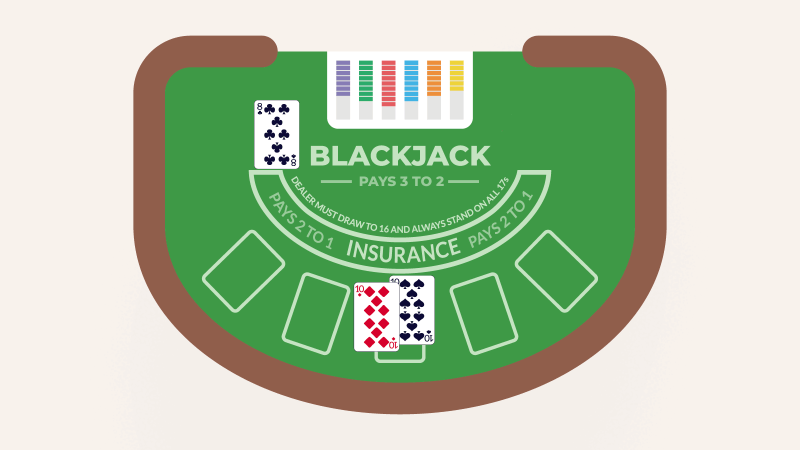What Does Insurance Mean in Blackjack?
If you are new to the world of iGaming, the term “blackjack insurance bet” might pique your curiosity. On the surface, it sounds like a savvy move, but does it hold up under scrutiny? In this article, we’ll delve into the concept of blackjack insurance bets, how they work, and whether they’re a worthwhile strategy for players.

Understanding How Blackjack Insurance Works
To grasp the nuances of blackjack insurance, let’s start with the basics. A blackjack insurance bet is a side wager that becomes available when the dealer’s face-up card is an Ace. Essentially, it’s a bet you place to protect yourself in case the dealer has blackjack.
The odds for blackjack insurance bets typically stand at 2/1, offering a potential payout. However, there’s a catch – the maximum bet allowed is usually half of your primary wager. This allows you to recoup some losses if the dealer does have blackjack, even though your main bet goes down the drain.
It’s important to note that you can only take insurance bets before the dealer reveals their hole card. If that hole card holds a value of 10, your insurance bet pays out.
Illustrating Blackjack Insurance with an Example
Let’s break down how this works with an example. Imagine you start the game with a bet of A$10, and the dealer’s visible card is an Ace. In this scenario:
- You place an insurance bet of A$5.
- If the dealer has blackjack, you win A$10 from your insurance bet, and you reclaim the A$5 you bet as insurance.
- However, you’ll lose your initial A$10 bet unless you also have blackjack.
In the other scenario where the dealer doesn’t have blackjack, it’s straightforward – you lose your A$5 insurance bet, and the game continues as usual. This strategy applies whether you’re playing in online casinos or engaging in live dealer blackjack with real human dealers.

Should You Opt for Blackjack Insurance Bets?
When learning the ins and outs of blackjack, it’s crucial to understand when to utilize the insurance betting option. Many experienced players will tell you that, in most cases, taking a blackjack insurance bet is ill-advised. However, there’s a specific situation where it can flip from a bad idea to a good one.
Consider the following scenario:
- You’re playing a single-deck blackjack game.
- You’re dealt a pair of 10s, and the dealer’s face-up card is an Ace.
- With 14 tens and 33 non-ten cards left in the deck, you have the option to place an insurance bet.
In this case, experts advise against taking the insurance bet as the odds are higher than 2/1. If you already have a strong hand, such as a 20-valued hand, insuring it is unnecessary since you’re already in a favorable position.
Conversely, imagine a deck with only 10s remaining. Here, it’s wise to consistently opt for insurance. Similarly, if you hold a 19-valued hand, it’s a smart move to protect it against the possibility of the dealer’s blackjack by using insurance.
On the contrary, if there are 20 cards in the deck with only two of them being 10s, the odds of the dealer having a 10 are low, making insurance less appealing.
Ultimately, your success hinges on your focus during online blackjack gameplay and your ability to track the cards. An awareness of the remaining 10-valued cards allows you to make informed decisions about whether insurance is worth it.
Why Avoid Blackjack Insurance Bets?
While players may rationalize insurance bets as safeguards for strong hands like 20, this strategy is inherently flawed and puts them at a disadvantage.
It’s crucial to recognize that the insurance bet comes with a 3% house advantage. Furthermore, it only pays out when the dealer’s blackjack involves a 10-point card, a relatively uncommon occurrence. Despite the 2/1 payout ratio, the casino reduces the payout by 3% whenever you opt for blackjack insurance.
Consequently, relying on insurance bets in blackjack could lead to diminished winnings and exacerbated losses over the long haul. While tracking remaining cards might justify sporadic use of this strategy, it’s only effective in the short term.
Summing Up Blackjack Insurance
In the grand scheme of things, even if you feel confident in your ability to predict blackjack outcomes, it’s generally best to steer clear of insurance bets. While the likelihood of the dealer achieving blackjack varies, they’ll probably have blackjack less than one-third of the time.
Occasionally, insurance bets may pay off, but over time, you’re likely to lose money if you make them consistently. In essence, blackjack is arguably the sole casino game where insurance is almost always a disadvantageous move. Staying mindful of this can help you make better decisions at the blackjack table.
